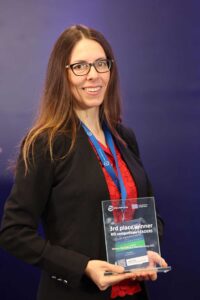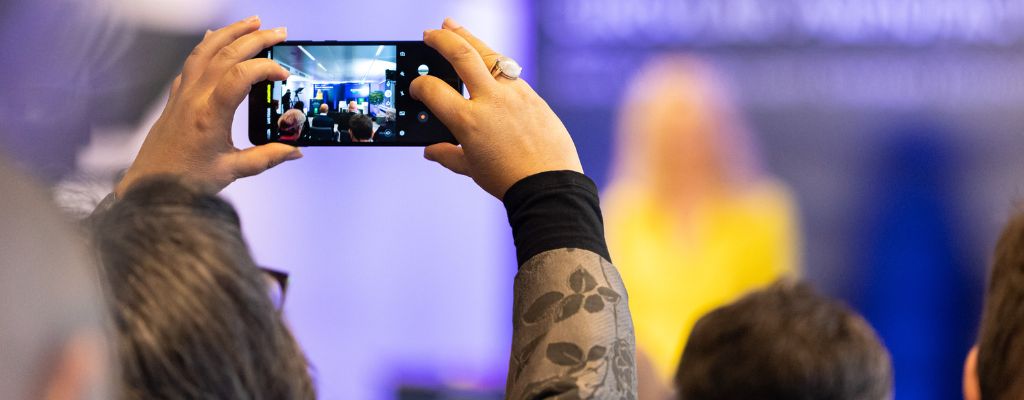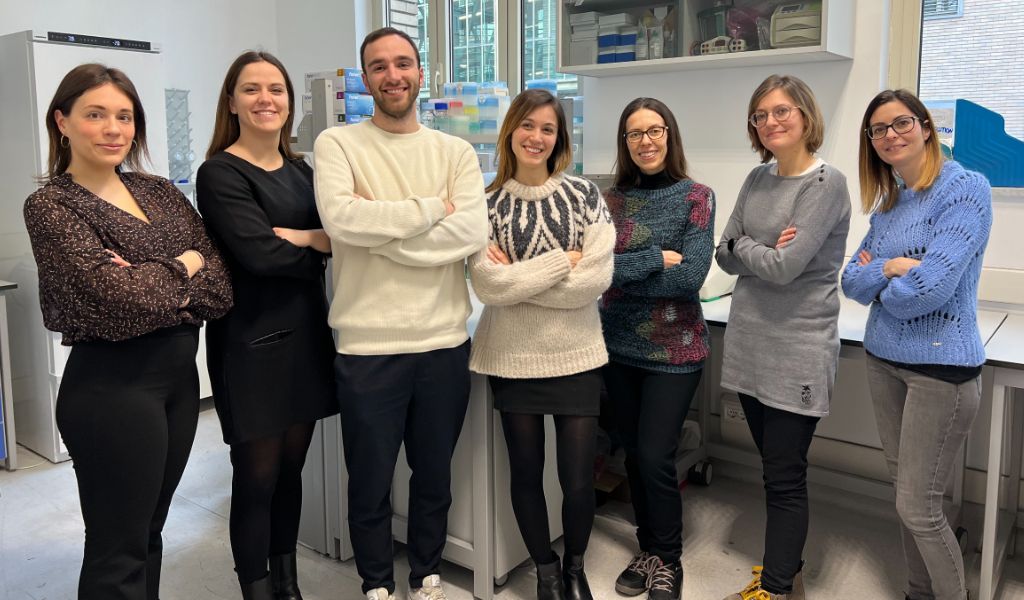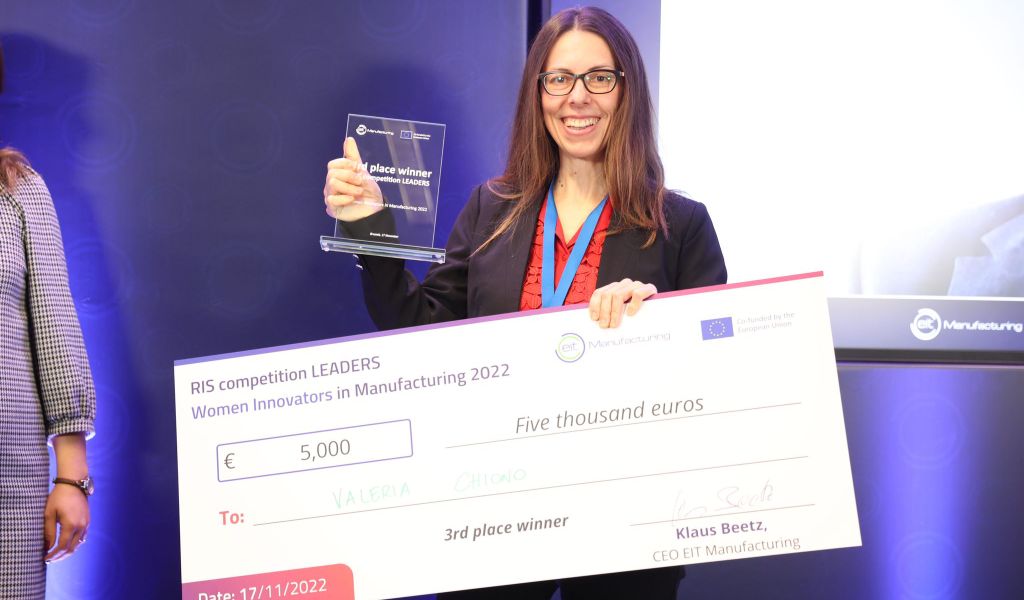Interview with Valeria Chiono
From an early age, Valeria Chiono was deeply attracted by science. Her curiosity about a variety of topics induced her to study chemical engineering. In 2022, she has won support for her POLHYRNATECH technology by being award the third prize of the EIT Manufacturing RIS LEADERS 2022 competition.
In this interview she tells us about her career and her motivation to choose the manufacturing sector as a career path as well as how, through POLHYRNATECH, efficient treatments for a broad range of diseases can be developed.
Valeria, when did you discover your passion for science?
Honestly, it was during scientific High School, which provided me with a wide range of knowledge from literature to chemistry and physics. There I decided to follow my greatest passions: chemistry and technology. Thus, I decided to study chemical engineering at the University of Pisa. At that time, I had already been fascinated by materials science and technology applied to polymers for some time.
When did you dig deeper into researching?
After almost two years I spent working at the University of Pisa under research contracts, I started my PhD in chemical and materials engineering and finally got the doctor’s degree. The PhD period was among the most exciting ones in my professional life, as I had the chance to completely devote myself to tissue engineering research – and I am still passionate about it.
Afterwards, I worked in the bioengineering research group as a post-doc fellow. In those years I gained more competences in the bioengineering field, designing scaffolds, hydrogels and drug-loaded particles for a variety of different applications in regenerative medicine, and expanding my network of collaborators.

Valeria Chiono won the third prize of the LEADERS competition.
Then, I was awarded a prestigious national project on cardiac regeneration, which I coordinated from 2012 to 2015. Thanks to this achievement, I got the position of researcher at Politecnico di Torino. Subsequently, I was part of an international research project on nanomedicine and drug delivery entitled “Smart Injectable Drug-Delivery Systems for Parkinson’s and Alzheimer’s Disease Treatment”. In the framework of this collaborative project, which I managed for two years, I visited scientists at the University of Cambridge. In 2015, I got the position of Associate Professor at Politecnico di Torino. Only three years later, I was awarded the ERC Consolidator project BIORECAR: thanks to this achievement, I made further progress in my career and I became Full Professor at Politecnico di Torino.
Why did you choose the manufacturing industry as your domain of work?
I have always been fascinated by materials science and technology, especially their application in the design of polymer-based substrates for regenerative medicine. The wide versatility of manufacturing industry allows progress in the design of medical devices and advanced therapies, to address health challenges. This already has fascinated me since my early studies.
What makes this field particularly exciting for you?
The manufacturing industry offers lots of possibilities in terms of materials, methods and modification strategies to reach your aim. Furthermore, it is possible to add new “ingredients”, i.e., to design new materials, to invent new methods and new modification strategies, expanding the existing combinations.
Thinking about the optimal materials, processing and modification technologies to get products able to address and solve health challenges is extremely exciting for me: I feel myself as an “artist” looking for the most impactful combinations to get the final picture.

Also, the audience was fascinated by POLYHRNATECH.
What is the most exciting aspect of your current position as a professor?
My work as a professor has different exciting aspects. There are challenging research projects in regenerative medicine in a collaborative framework, involving multiple scientists with complementary expertise. Furthermore, I love teaching and being in contact with enthusiastic students, who are eager to learn key concepts of the field of regenerative medicine engineering. And moreover, the opportunity for continuous learning and growth, while researching and teaching is very exciting.
When did you start thinking of a solution like POLHYRNATECH?
Since 2018 I have been coordinating the ERC project BIORECAR. The project is aimed at the development of advanced strategies for myocardial regeneration through the design of an injectable biomimetic hydrogel releasing miRNA-loaded nanoparticles. That means we have been working for years on finding a possibility to safely and efficiently carry RNA drugs to specific cardiac cells, to induce them to undergo “reprogramming” for cardiac regeneration. During these efforts, we have designed and patented a new versatile platform of polymer-lipid hybrid nanocarriers for RNA therapy to target cells, called POLHYRNATECH, which are the focus of our business idea.
What makes POLHYRNATECH so special?
Although it has been developed for cardiac regenerative medicine, its versatility allows exploitation for other regenerative medicine applications. Now we are investigating POLHYRNATECH application in the treatment of neuromuscular diseases. These diseases affect both nerves and muscles at the same time and are not as common as cancer. ALS, the disease that Stephen Hawking had, is a better-known example. Hence, POLHYRNATECH represents an exciting possibility to expand the applicative horizons of RNA therapies.

Valeria Chiono (3rd from right) and her team
What benefit does your solution offer to society?
Society needs POLHYRNATECH to fully exploit the remarkable therapeutic potential of RNAs as frontier drugs which are able to address the worldwide socioeconomic burden of age-related, rare and infectious diseases.
We developed an easy and versatile method for the preparation of polymer-lipid hybrid nanocarriers, provided with a lipid core allowing high RNA loading, a polymer shell ensuring stability and surface functionalization with ligands to enhance safety and cell specific release. These biocompatible nanocarriers can release their payload to target cell types, driving RNA therapy to the next level. This means that we might provide safer and more efficient RNA therapies, reducing or avoiding adverse or off-target effects for patients. Furthermore, new RNA therapies could be developed for new applications, beside the treatment of liver-related diseases and Covid-19 vaccines, currently available in clinics.
The manufacturing method of POLHYRNATECH nanocarriers is environmentally friendly – thanks to solvent minimization, high production yield and therapeutic efficiency. Its versatility will decrease the research costs and time to market for new RNA therapies able to treat multiple diseases.
What is your next milestone?
We have already patented the technology. Our next milestone is to establish the POLHYRNATECH start-up by 2023, exploiting the technology to deliver two different products: Firstly, kits for the preparation of nanoparticles for research studies on RNA molecule delivery and secondly, new RNA therapies for clinical applications. Indeed, POLHYRNATECH nanoparticles can be prepared rapidly and through a user-friendly approach, hence they can be made available to researchers in the form of “transfection kits”, that means materials to be combined with customers’ RNA molecules to form nanoparticles for laboratory studies. Alternatively, POLHYRNATECH nanoparticles loaded with specific therapeutic RNA molecules can be further validated for clinical use for the treatment of specific diseases, such as heart failure, neuromuscular diseases, or others.
My personal next milestone is to translate my most impactful research outputs, such as POLHYRNATECH technology, into industrial products reaching the market, with the final aim to treat unmet medical needs.

Valeria is proud of winning 3rd prize of LEADERS and wants to encourage women to consider a career in manufacturing.
Which message would you give to other women considering a career in manufacturing?
I strongly encourage interested women to consider a career in manufacturing! Our dedication and creativity combined with passion and commitment can make the difference, and lead to breakthrough innovations. From an industrial perspective, more gender inclusivity in manufacturing industry will also encourage new technological progress.
Talented women should not be discouraged from stereotypes like this industry provided career growth for men only, or by the fear not to be able to find a balance between family and work. The more women are involved, the more the manufacturing industry needs to ensure full inclusivity, including career opportunities and support to families. Everybody will benefit from this: the workers’ quality of life is improved, and outputs are enhanced. Thus, the entire society will benefit.
Apply now for LEADERS 2023!
Are you a woman innovator? And do you have a solution that addresses manufacturing-related challenges? Then take a look at the LEADERS 2023 Call. It’s open to applications now – you can submit your application until 18 July 2023.
All information about the RIS LEADERS Call 2023
About the LEADERS competition
In November 2022 the “LEADERS – Women Innovators in Manufacturing” prize was awarded by EIT Manufacturing as part of the Regional Innovation Scheme (RIS) for the second time. Thereby, EIT Manufacturing wants to draw attention to women innovators and women in the manufacturing industry, as women are still underrepresented in this sector.
For the final pitch a jury selected six candidates, whose projects play a leading role in developing solutions addressing manufacturing-related challenges with strong financial, environmental, or societal impact.
What is the EIT Regional Innovation Scheme (RIS)?
More information about the EIT Regional Innovation Scheme (RIS)
Get to know another finalist of LEADERS 2022!
Soraya Gadit – founder of the Portuguese innovation platfrom Inocrowd

